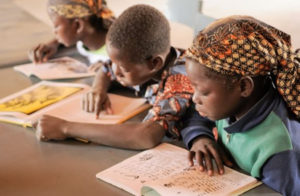Right to Play report reveals improvement in early literacy skills in Ghana
 The Right to Play Ghana’s ‘Enhancing Quality Early Education’ project has shown significant improvements in early childhood education in Ghana.
The Right to Play Ghana’s ‘Enhancing Quality Early Education’ project has shown significant improvements in early childhood education in Ghana.
The evaluation revealed a rise in early literacy skills from 29 per cent at baseline to 66 per cent at endline.
Early numeracy skills also improved from 43 per cent to 81 per cent, and social and emotional development jumped from 41 per cent to 82 per cent.
These gains included better student abilities in identifying letters and sounds, recognizing numbers and shapes, completing puzzles, understanding one-to-one correspondence, and grasping the mechanics of writing.
Professor Kwame Akyeampong, the Project Consultant, presented these findings at the Partners in Play (P3) Project’s close-out event, organized by Right to Play Ghana.
The event, held on the theme “Play-Based Learning: Innovative Pedagogy for 21st Century Learning,” celebrated the creation of a playful learning environment for both children and educators in Accra.
Play-based learning has proven effective in fostering critical social and emotional skills in children aged three to five, such as recognizing emotions, relating to others, and navigating social dynamics.
The Right to Play Project, which started in Ghana in 2022, was implemented in collaboration with the Ministry of Education, Sabre Education, and Innovations for Poverty Action (IPA).
The project covered the Volta, Greater Accra, and Northern regions, focusing on supporting the implementation of the new standard-based curriculum.
The curriculum encourages teachers to adopt creative pedagogies, including play-based learning (PBL), to improve overall learning outcomes.
Although the project is officially ending, Prof. Akyeampong stressed the need to sustain its impact and continue the significant investments made in early education.
Ms. Josephine Mukakalisa, Country Director of Right to Play, also highlighted the success of the project, noting the significant improvement in children’s development and teachers’ skills and confidence in using play-based approaches.
The project reached 140 schools across nine districts, trained 4,198 kindergarten teachers, 200 Early Childhood Education coordinators, 220 Teacher College tutors, and 2,800 caregivers.
The initiative emphasized the importance of play for children’s development and learning outcomes.
Ms. Mukakalisa noted that play-based approaches at the kindergarten (KG) level had accelerated foundational learning for children, enhanced teaching practices, improved classroom management, and increased knowledge and support for play among parents and caregivers.
She called for continued investment in both pre-service and in-service teacher training on play-based approaches, the integration of play-based learning into national education policies, and the expansion of school infrastructure and access to play-based materials.
Ms. Mukakalisa also advocated for local-level campaigns to increase awareness and gain support from school leaders, community groups, parents, and caregivers about the power of play in education.
She expressed her appreciation to all the partners and stakeholders involved in the project.
Prof. Yayra Dzakadzie, Director-General of NaCCA, who represented the Minister of Education, noted the significance of play-based learning and stressed the need for future evaluations to assess its effectiveness.
She pledged NaCCA’s continued support for training educators and providing the necessary resources to make play-based learning an integral part of Ghana’s education system.
“As we look to the future, our focus must shift to sustaining and expanding the gains made. Play-based learning is not just an educational tool—it is a universal language that equips children with the skills needed to navigate an ever-changing world.
“We are also rethinking assessments to better reflect the competencies we want our students to develop,” she said.
Mr. Stephen Abamfo, the Regional Education Director, called for the project to be scaled up and owned by the government for the benefit of the other 13 regions and districts across the country to improve the education sector.
It was supported by the Lego Foundation.
Source: GNA
